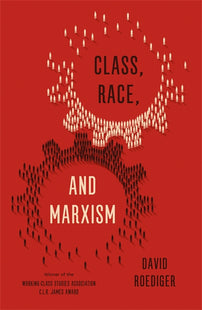What is class today?
Common Wealth’s Amelia Horgan spoke to historian Gabriel Winant about class in the twenty-first century. Gabriel Winant is the author of The Next Shift: The Fall of Industry and the Rise of Health Care in Rust Belt America (Harvard University Press: 2021).

Amelia Horgan
How should we understand class?
Gabriel Winant
I'm very glad to talk about this because I think that, despite our reliance on the concept of class on the socialist left, we don't always mean the same thing by it. I think the best way of understanding class is as a process. Harry Braverman says that although we tend to resort to a shorthand when describing the working class, in fact, when you look closely, you're always looking at something more fluid than solid — the constant transformation in both the forces and the relations of production. And the pressures of social reproduction on the working class are always remaking and recomposing the particular concrete social realities of working-class people and their lives in ways that demand empirical attention, but also, some degree, I think, of conceptual flexibility. That's to say that although there is a hard, non-negotiable conceptual core of what it means to be in the proletariat, there is a wide belt of contingency around that. Take unemployment — this is a classic intervention over the last couple of decades: to explain un- and underemployment, as an important part of global proletarian experience, the forms of contingent attachment to the labour market. I’ve written about a kind of similar claim on the opposite sociological side of the working class, which is to think about middle-class professionals and how we understand their connection to class. And it's once you allow for these kinds of empirical and to some degree, conceptual flexibilities around the harder Marxist core of class analysis that you also gain new tools for thinking about the relationship of gender and class of race and class.
The debates around social reproduction theory and housework would be another version of a similar kind of innovation. It doesn't necessarily trouble the central core of what we're doing when we do class analysis. But it does require new forms of empirical investigation, it requires conceptual adjustment, it requires Marxists to take on insights from feminism, most importantly in this case. Then the reason these things become controversial is that it then raises new questions about political agency and possible sites of solidarity, which I think is what's generative about this approach of describing. It gives us a way as Marxists and as people interested in working-class power of responding to emergent social struggles that don't on their face appear to arise from some classical class relations; it gives us a way of understanding them, responding to them and connecting with them and affiliating with them potentially that doesn't require us to kind of abandon commitments of our own or to write them off as error or false consciousness.
Amelia Horgan
I think that conceptual openness is really important, rather than a common assumption which holds that if we just had the right concepts in the right order, that everything would just fall into place.
Gabriel Winant
It seems to me that it's actually quite difficult to see how that that could be from a reading of and fidelity to Marxism; how it could be that you could imagine a kind of stable ordered concept of class? It seems that the whole dynamic of the transformation of the forces and relations of production and the genesis of the industrial reserve army, once you begin to really flesh that out sort of sociologically and empirically in a way that Marx only sort of does, requires this sort of openness.
Amelia Horgan
And how do race and gender relate to class?
Gabriel Winant
There are different ways of thinking about this. These are debates that I'm interested in and participate in, particularly on gender. But I think here, too, it's important that analysis of these questions learns from struggle and is transformed by struggles as they develop. So, I speak from a particular historical moment in the evolution of capitalism and social struggles. Probably if you ask me again, if we meet again in ten years and you ask me this question again, I would say something different, I expect.
[book-strip index="1"]
But from 2023, it seems to me that the way that we incorporate the centrality of race and gender into the constitution and formation of class is to see them as material phenomena. That's the critical first step: although they have ideological expressions that are important and often form the level in which we understand and contest them they are not merely epiphenomenal. Both gender and race are phenomena of the material base, if you want to use a base and superstructure metaphor, that's to say, they are forms of organisation of the forces of production, or of one force of production in particular — labour power — which they render available in particular forms for which they set the cost of reproduction, and at particular levels, again, all contingent, contested, all of that. They form sites of accumulation or non-accumulation of employment or non-employment according to the relationships between those kinds of material facts about the kind of cost and availability of labour power on the one hand, and other dimensions of capital accumulation on the other.
Let me say a word about gender more specifically. It seems to me that, and here, I'm very, very indebted to the work of my friend and comrade Alyssa Battistoni, that what housework (which was the site of many of these kinds of debates and analysis, particularly the 70s and 80s) has in common with other kinds of waged gendered labour in the kind of service economy that I write about, for example, is a kind of interpersonal, relatively embodied labour process that is not especially mediated by fixed capital.
This has to do, as Alyssa shows very well, with the ways in which the body itself, the human person, living labour, resists full subsumption into capital. Its rhythms, although they can be altered on the margins in important ways by their social context and historical context, are not or can never be wholly reduced to the value relation and temporality and rhythms of capital.
It’s for this reason, with a few further theoretical steps that you’d need to fill in, that service work in general including housework (we can see housework as an unwaged subset of service work) is resistant to productivity increases and is therefore typically relegated to the margins of the capitalist mode of production: either entirely non-commodified as in the home or only partially incorporated into the money economy by means of state subsidy. This is true of lots of forms of service provision or of very low margin often self-exploitative work, such as someone who works a house cleaner. Food services is similar in some ways. In these cases, there is a materiality, there is a question of concrete labour processes and their relation to accumulation opportunities. Versions of that analysis in general underlie the differentiation of the proletariat by class, by gender, by race, and other categories as well. We could repeat a version of this analysis for race in a certain way. Then the question becomes one of what Stuart Hall calls “articulation”. The ways in which, borrowing from Althusser and to some degree world systems theory, differently positioned sites of accumulation in a global capitalist world system are linked to each other, and that that differentiation is itself constitutive of global capitalism.
Amelia Horgan
I was wondering if you could say anything about the current debate on class composition in the US. And you can define the debate as relating to what people are saying about it online, on Twitter, or as people are saying about it elsewhere, however you think is most useful or relevant.
Gabriel Winant
Let me try to reconstruct the most generative versions of the other side of the debate — I think there are useful things there. I think the way that it gets mediated through Twitter and Twitter-adjacent forms of writing often is not the most helpful. But I think that there is a critique there that I'm actually interested in, and I think has validity.
[book-strip index="3"]
It seems to me that the question is twofold. On the one hand, there is the question of what sense can we make of the trajectory of employment, of the composition of the working class? This is a global question you would need to ask you about particular societies. This particular debate was about the global north, the industrialised service economies. I'll limit this answer to there for now. How should we understand the composition of the working class in the global north? What is its trajectory? What political possibilities does it enable or disable?
Then there was also a second question about a division of labour under socialism, that I think, is also asked in the same debate. What might that look like? What might we want that to look like? That's not an uninteresting question from my perspective, but it seems to me a bit of an idle exercise. That’s not to say that I don't think we should discuss it. But from my perspective, I mean, the whole thrust of my own work is to try to construct, to excavate and reconstruct the possibilities of working-class solidarity and power as they emerge out of the capitalist labour market in any given moment.
Of course, there's more than one Marxism, I'm not going to claim this as the correct Marxism. But this is the spirit that I have always taken Marxism in. That the reason it's a dialectical method — it allows us to look at the developing relations of exploitation, the developing division of labour and to identify within those relations of exploitation, within that division of labour forms of interdependency, that, although mediated through capital, might nonetheless generate the possibility of working-class solidarity, power, and social transformation.
My own work tries to kind of reinvent some of that analysis — the very familiar analysis for industrial economies that we've had a century ago — for deindustrialised service economies. And to show that from any given kind of point in the development of capitalism there are not necessarily immediate possibility of social transformation, but that the material bases are always developing in ways that can give rise to struggle. Those struggles can be generative and can take you somewhere. And that this is as characteristic of a post-industrial service economy as it was of an industrial economy although differently so. It's not simply a kind of repetitive identity between the two. That’s why there's work to do to understand the ways in which a post-industrial service economy contains ultimately equivalent possibilities. Because they’re equivalent possibilities and not identical possibilities to the ones that we would have recognised in 1900.
[book-strip index="2"]
Now, the other side of this argument is to say that 1) there were distinct forms of economic power that industrial workers had that service workers do not have, which I think is correct, as of now, anyway. And 2) that there are distinct needs for industrial production that we continue to have, which makes sense to me. If you think about green transition type questions and overhauling our infrastructure and our built environment, it's not an unreasonable idea. But 3) that industrial production, or manual, blue-collar labour has distinctly humanistic, rewarding dimensions, and that I reject. Which is not to say that it can't have those qualities, not say that it doesn’t often have in fact, but that it doesn't intrinsically embody that in any way different from other forms of labour. It seems to me that we shouldn't allow those three dimensions of the argument for industrial work to blur into one another.
There are important questions asked about Green New Deal type programmes, which I am enthusiastic about and supportive of and what kinds of labour they involve, and that means asking important question about working-class power, strategic questions, and I’m all for those discussions. But I don't think that of as ultimately a kind of fetishistic relationship to these particular labour processes ought to result from either the material necessities of industrial products, or the strategic possibilities of industrial employment. This is something that I was at great pains to try to show my own book about the steel industry was that although these were very good jobs in lots of lots of ways, they made people quite miserable also.
Less generously, I suppose, I would say that the conflation of those three points that I just laid out — the collapse of the strategic and the material questions into a f humanistic question — bespeaks a kind of nostalgia. And nostalgia in general seems like completely at odds with Marxism. It causes me to want to resort to explanations about why people are so resistant to the kind of forms of conceptual and empirical adjustment I was talking about earlier. It seems to me that there’s an odd resistance there.
Amelia Horgan
Your work shows the interdependence of social reproduction and production, that they’re not separate spheres of activity. What should be taken conceptually and practically from the knowledge of that entanglement? What can be done with it?
Gabriel Winant
Very good question. And it's a challenging one. It seems to me that there's a two-sided issue here. On the one hand, I think as social reproduction theorists would say, the question of the relationship between the sites of social reproduction, the family classically, but then also schools, hospitals, childcare institutions, elder homes, etc., the sites where capital encroaches upon those become sites of struggle, and those struggles can take the form, and often do take the form of labour struggles.
If you think about teachers on strike for smaller classrooms and more services for students, for example. I live in Chicago, where this is a major dynamic. And in fact, we're currently in the midst of a mayoral election, a very high stakes mayoral election, in which the left-wing candidate is a former teacher who participated in a hunger strike to keep a school open that the neoliberal Rahm Emanuel administration attempted to close, and then went into politics through the teachers union from there and got elected to county office, and he's now running for mayor. The right-wing candidate is the candidate of the police union. It's a direct confrontation in a certain way between the care economy and the carceral state, or it seems to be evolving in that direction.
[book-strip index="4"]
I think that social reproduction theory has something very valuable and important to say about the ways that the interface between social reproduction and capital generates conflict.
That being said, I do think we run a risk with this approach. I’ve learned a lot from this approach. I'm very indebted to it and think of myself in some ways as part of that tradition. But I think we run the risk of treating sites of social reproduction as a besieged but separate and shielded sphere which is organised by its own ethical logic — the ethics of care, the policy of the democratic state, whatever it might be — that is not traversed by the logic of capital in some way. And this is sort of what I was getting at with that earlier discussion about what service work and housework have in common and its relationship to low productivity, with productivity limits, and so on. Because it does seem to me that institutions of social reproduction don't analytically pre-exist the capitalist social relations that are around them. They are produced in and around and through the kind of development of capitalism in ways that permeate them much more powerfully than I think that kind of shorthand analysis would suggest. Which is not to say that the struggle of teachers for a smaller classroom is not a generative and important struggle, rather, it's to say that I think it's important simultaneously, to imagine contesting the division of productive and reproductive labour on a larger scale.
Now, that's not an easy thing to turn into a political programme, especially at the level of a municipal election or something. But the question is not just “What is the quality of this work?” or “What is the quality of the services?”. Those are both very important, but the question is also what role these services play in our lives and who is assigned to do this work? Those questions, I think, begin to take you beyond that shielded ethical sphere and into a wider set of questions about the division of labour in a different kind of way.
I'm saying this in an abstract way but just to be more concrete take Medicaid. Medicaid is a federal and state means-tested health insurance program for the poor. If you fall under a certain income level — it varies somewhat by state — you can qualify for Medicaid and get health insurance that way. Medicaid is the only public indefinite entitlement to long term care. If you need long-term care, either in your home or in a nursing home you pay for it out of pocket or through some private insurance scheme that you may have bought, which are basically scams, or you're poor enough to qualify for Medicaid.
In the nursing home industry that then determines the kind of home and the kind of care you're going to have access to, which is often quite bad, which is why, quite understandably, people generally prefer homecare. Medicaid will pay for a disabled person to be taken care of in their home by their relative and will essentially wage that relative. It’s an enormous thing in this country and I think it’s interesting: on the one hand, it depends on the pre-existing relations of family in a way that is obviously going to lend itself to gendered exploitation, on the other hand, the idea that the state might take a role in organising the processes of social reproduction in ways that implicate individuals in one another's needs more profoundly is not on its face a negative idea, although the way that it's played out is often basically just that daughters have to do this.
I say all that just to say that my hope is that these struggles at the point of reproduction over the kind of working conditions and quality of services — because of the economic limits of the kinds of reforms are going to be possible within the kind of near horizon of capitalist social formations for how we provide schooling and care — can point toward a wider contestation of the division of labour, the idea that we ought to be more implicated in taking care of one another in the rhythms of everyday life and that actually the state can do things to help make that possible and support that, through the reduction of working hours, as well as the subsidy of various kinds of care.
There are all sorts of intermediate levels of care and reproduction that one could imagine between on the one hand, the bureaucratic nursing home, and on the other hand, the household. I think that would be a generative site of both state investment and social struggle — very quickly when you contemplate this idea seriously, it begins to take you into the politics of gender in a quite profound way, because a reorganisation of the division of labour on a significant scale, would require the revaluation of what men and women do and who men and women are.
This is speculative, but it seems to me that the ongoing decomposition of normative gender that we can all see around us, is in some ways, a kind of automatic development, or rather a kind of mechanical development almost, of the ways in which the capitalist mode of production is not able to reproduce itself that effectively anymore through a strictly gendered division of labour. There is a wider variety of genders that are becoming kind of possible and needed, but that's extremely politically fraught and contested. This argument is to link the question of how human beings are gendered and gender themselves to the question of the division of labour. Because it seems to me that the kind of narrower version of the social reproduction theory argument doesn't really open onto those kind of wider expanses of what roles we have in society in terms of our responses to our intimate responsibilities to one another. And it's difficult for me to see how we could develop a socialist society or even more minimally a humane society in which those responsibilities don't grow.
Amelia Horgan
Agreed, it’s not merely a question of noting the presence of some sort of interdependence, but of thinking through the dynamics of that interdependence. Could you talk about the history of struggles for control by workers over the labour process?
Gabriel Winant
I always tell my students that in the early parts of the second industrial revolution and the late 19th century in this country skilled industrial workers controlled the process of production in almost every detail. There was a general sense that the owner bought the equipment and the capital and the plant and whatever supplies the worker told him that needed and otherwise was not really involved. This was true in a lot of metalworking, for example, and in shipbuilding, and engineering, those kinds of industries. As Big Bill Haywood, the IWW leader famously said the manager's brain is under the workman's cap.
[book-strip index="1"]
If you want to identify a moment in which industrial work did have this kind of humanistic quality that I was criticising earlier, I think this is where you would want to go. Because there were real elements of democratic control. There was a hierarchical phenomenon to this as well — the craft workers were in the union, typically, the unskilled helpers were not, that distinction itself had in this country had racial and ethnic dimensions. But nevertheless, as I always tell my students, it used to be that in many shops, when a manager entered the shop, the workers would all put down their tools and stop working, that you would not work while the manager was looking at you.
That's the kind of ethic that one has to admire and appreciate, first of all, more generally, although there are distinctive material environments, certain kinds of bottlenecks, of technical bottlenecks that depend on certain kinds of skills, and so on, that really enable that, despite that, there are moments like that in every job.
That's not to say that all workers can do that in the same way. Certainly not. But there are moments in every job because of the distinction between abstract and concrete labour, or labour and labour power, if you like. That actually it's not possible for an employer to dictate and control every moment of a worker’s embodied routine on the job; even when it concerns the most surveilled workers, the ones who are most kind of made into marionettes. If you think about Amazon warehouse workers who are technologically surveilled and choreographed down to a very, very fine scale, even they have a million little tricks for trying to get around that, trying to resist that trying to make their own decisions on the job in little ways that one would not want to call democratic. I mean, certainly, under a Nazi regime the fact that people had little tiny moments of dissent, that doesn't make Nazi Germany a democracy. The same is true by analogy in an authoritarian workplace. All this is to say that there is a kind of fundamental contradiction in capitalist employment, which generates a kind of democratic practice at a very small scale in the pores of the everyday.
It seems to me that [there is a lot to be gained from] thinking not just about governance, not thinking about policy or law or even with what comes collective bargaining, but at a more basic level, thinking about how to nourish and develop solidarity among workers. When I have worked in workplace organising this was always the thing I tried to find out about workers and about their jobs and about their relations with each other. What are those little moments where they have identified just a tiny sphere of autonomy, a tiny practice of resistance? Do they talk about that with each other? Do they share those? And often you find that they do. You know, “Hey, I found a way of listening to music while working in the warehouse, if the boss doesn't know. I have a hat on over my earbuds”, things like that.
And certainly, in the care economy, which I study, there's a perverse way in which that goes the other way, where workers actually have to break the rules in order to make sure patients are taken care of sufficiently. Because management is sort of tacitly expecting and banking on workers own kind of, let's call them democratic practices. Nevertheless, they still have this kind of quality of being of seedbed or a germ of workers’ solidaristic connection with each other and of the belief that they actually understand the value of what they do in a different and more profound way. That’s not the case in every job — I don’t think a lot of warehouse workers would say that to you. But certainly, a nursing home worker will say that to you; she understands what it means to take care of a vulnerable person in a different way than the people who own and manage her nursing home, because of these little moments of excess and surplus and so on.
So, again, I think that if we want to take seriously the idea of work as a kind of creative and self-creating site of human experience, which I think we should, then it seems to me that we ought to try to imagine how we could, both at the level of struggle and organisation and also at the level of programme expand the space for those practices. I do think working hours are a very obvious place to look; often these micro-struggles occur over the pace of labour in some way or are related to the pace of labour. And even to the extent that quite moderate organisations, trade union organisations and so on, can institutionalise the practice of workers of sharing these kinds of tips and tricks with each other, I’ve seen that be quite helpful in expanding workers’ sense of their capacities on the job, the way that they have democratic powers that arise from on the one hand the contradiction between labour and labour power, or concrete and abstract labour, and on the other hand, their connections to each other. That’s not a neat programmatic answer about democratising work, but it does seem to me that the materials are there for it in every workplace in one form or another.
Amelia Horgan
That’s the place to start in a way. And you can see something funny when it happens negatively, that is when those norms are violated, when someone new joins and they start working too fast. Everyone has to say, “What are you doing? You’ve got to stop, slow down!”. That’s an interesting moment.
Gabriel Winant
I’m always trying to get people to recover the term “busting the rate” for when you go too fast. In graduate school, I used to say to people who finish their PhD too fast “What are you doing? you're busting the rate! We take seven years in this shop!”.
Amelia Horgan
Finally, is there a book or other text that you think people don’t read enough and ought to read more?
Gabriel Winant
I think people read Harry Braverman’s Labour and Monopoly Capitalism still, but I don't think people read it enough. It's from the 70s. It's an old classic that I think is often left aside. And I think you can get almost everything that you need for thinking about almost everything that we've talked about from that book, if you're willing to kind of think generatively and expansively with it.
Originally published by Common Wealth



